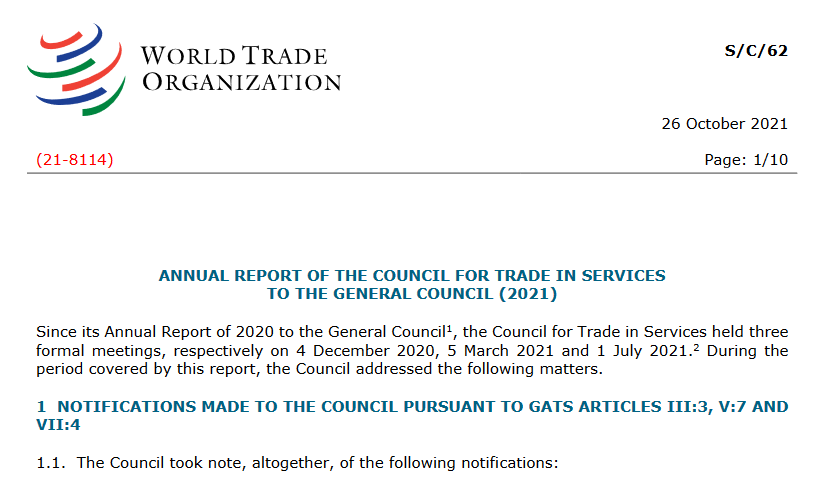
Russia’s trade policy review—Day 1, Oct 27. Day 2: today.
These are periodic peer-review sessions (every 5 years for Russia), based on reports from the @wto Secretariat (factual) and the government being reviewed.
See wto.org/english/tratop…
1/15
These are periodic peer-review sessions (every 5 years for Russia), based on reports from the @wto Secretariat (factual) and the government being reviewed.
See wto.org/english/tratop…
1/15
From a Geneva trade official:
Comments Day 1: > 40 members + 1 observer (Serbia)
Briefly:
POSITIVE—Russia is constructive in @wto and for the coming Ministerial Conference
NEGATIVE—Import substitution policies, the role of the state in Russian economy
2/15
Comments Day 1: > 40 members + 1 observer (Serbia)
Briefly:
POSITIVE—Russia is constructive in @wto and for the coming Ministerial Conference
NEGATIVE—Import substitution policies, the role of the state in Russian economy
2/15
US: recognises steps taken in @wto, but concerns about turning inward, contrary to the principles—non-discrimination, predictability, transparency, fair competition, under import substitution and forced localization.
Includes investment, IT, SPS, government procurement
3/15
Includes investment, IT, SPS, government procurement
3/15
EU: Russia’s constructive role not unnoticed, including participation in “plurilateral” talks. But concern about import substitution, questionable retaliation against political sanctions, closed government procurement, large state role, export restrictions.
4/15
4/15
CANADA: similar.
Concerns about: state dominance in key sectors eg, transport, energy, banking; lack of transparency, different rules applying to state corporations
Praise for: decision to reduce state-owned enterprises—Russia should decrease their total assets
5/15
Concerns about: state dominance in key sectors eg, transport, energy, banking; lack of transparency, different rules applying to state corporations
Praise for: decision to reduce state-owned enterprises—Russia should decrease their total assets
5/15
Switzerland: Russia’s diversification away from natural resources and commodities, eg, hydrocarbons, raises concerns because of export subsidies and import substitution, including financial support to exporters. Also concerns about state enterprises.
6/15
6/15
Japan: Praise—legal system reform, cooperation with Japan, growing bilateral trade
Concern—localisation/local content policies, including requirement to use Russian ships (and possibly Russian-made ships) to transport resources. Policies need to be predictable, transparent
7/15
Concern—localisation/local content policies, including requirement to use Russian ships (and possibly Russian-made ships) to transport resources. Policies need to be predictable, transparent
7/15
Ukraine complained of economic and trade pressure as part of Russia’s “aggression”, unilateral suspension of the free trade agreement, and unjustified restrictions on Ukraine products (bans or unjustified technical regulations, labelling, hygiene or safety requirements).
8/15
8/15
China: positive—economic diversification, attracting investment, legislative improvements, support for the trading system and #WTOReform, countering trade protectionism, participating in regional integration, contributing to negotiations especially on fisheries subsidies
9/15
9/15
India: positive—reforms in legal framework eg, customs procedures, export taxes, public procurement, foreign investment, competition, intellectual property protection, energy, financial and telecommunications services, collaboration on COVID-19 including vaccines
10/15
10/15
Russia (Senior official Ekaterina Mayorova)—the multilateral trading system is undermined by politics, tensions and unilateral actions by some members. Russia is committed to the rules-based @wto system and has cut tariffs since the last review (2016)
12/15
12/15
She said Russia has had to act for food security to guarantee a level of domestic production, a concern shared by many countries, exacerbated by sanctions—it has not raised import duties or banned imports and its agricultural subsidies are within its agreed limits.
13/15
13/15
She denied that Russia discriminates in favour of its state enterprises. All companies come under the same laws and taxes, except a few public monopolies, she said. She cited the reduction in Gazprom’s market share to less than 50% of domestic consumption.
14/15
14/15
35 members asked Russia 1,017 written questions.
All the reports and related documents on Russia’s latest trade policy review can be found here ⬇️.
More to be added later including (in a few months) the minutes and written questions and answers
15/15 wto.org/english/tratop…
All the reports and related documents on Russia’s latest trade policy review can be found here ⬇️.
More to be added later including (in a few months) the minutes and written questions and answers
15/15 wto.org/english/tratop…
• • •
Missing some Tweet in this thread? You can try to
force a refresh












